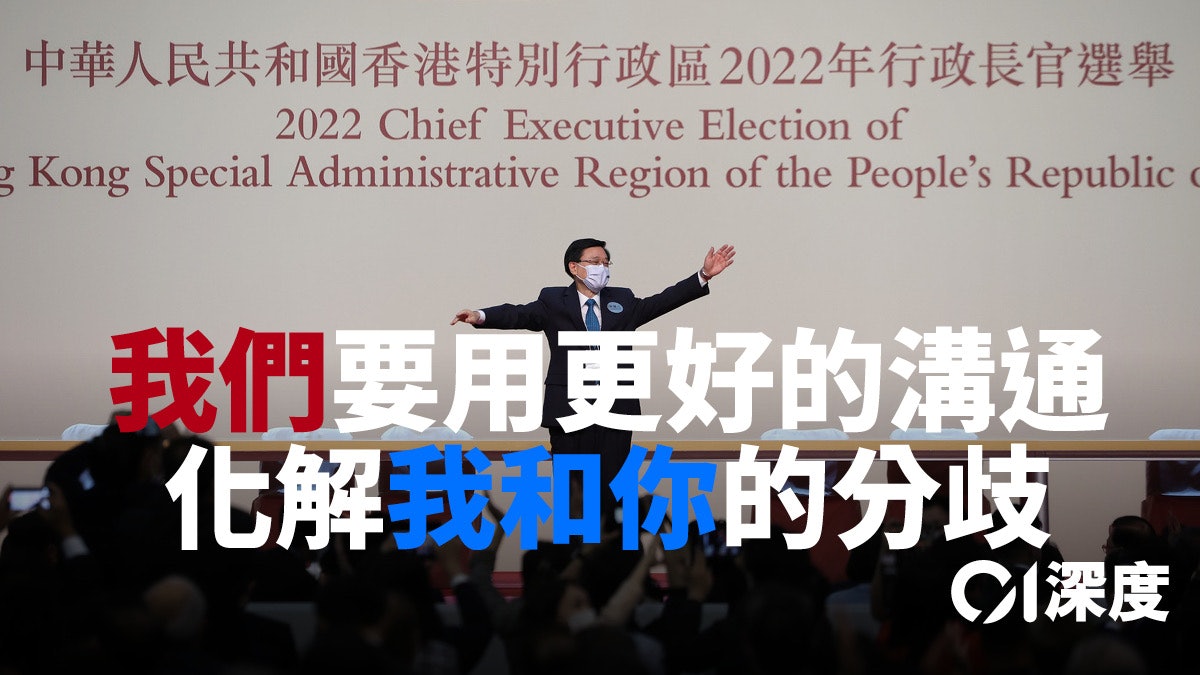The 6th Chief Executive Election was held yesterday (May 8). Former Chief Secretary for Administration, Lee Ka-chao, who had no rivals, won 1,416 support votes out of 1,428 valid votes, with a record-breaking turnout rate of 97.74% and support of 99.16%. The rate was elected as the next chief executive-designate.
Since the turmoil against the amendment bill in 2019, the central government is determined to reshape the "patriotic ruling Hong Kong". I believe that this result is in line with the high expectations of the authorities; coupled with Li Jiachao's high loyalty to serving the country and serving the public, the future situation can also be foreseen. highly stable.
However, just relying on the central government's efforts to turn the tide and Li Jiachao's enthusiasm may not be enough to solve the very difficult Hong Kong issue. After all, the basic premise of "opening a new chapter together" is that everyone is in the same time and space and has a common understanding of the problem.
Li Jiachao's slogan is "We and Us A New Chapter Together", and in English it is "We and Us A New Chapter Together".
Although he tries to bring out the idea of unity of "no distinction between you and me", the "I and we" adopted is a way of expressing a deliberate distinction between "self" and "other".
(Screenshot of Hong Kong 01 video)
"It is normal for society to have differences, and we can be in harmony and be different. I will use actions to win trust and narrow differences with results." "If elected, I promise to bring everyone a government that can do things and do things, so that Hong Kong can Step forward, without worries", "In the next five years, Hong Kong will be a place of caring, inclusive, diverse and inclusive, full of vitality and full of hope"... Since Li Jiachao officially announced his participation on April 9 In the selection of the chief executive, in addition to focusing on the three major directions of solving problems with results as the goal, comprehensively enhancing Hong Kong's competitiveness, and laying the cornerstone of Hong Kong's stable development, he also emphasized that he will establish a team that "does things regardless of you and me, strengthens me and us" to solve problems together Culture, hoping to play a new symphony for Hong Kong.
However, the premise of jointly solving the problem is to have a common understanding of the problem and to focus on the core of the problem, but this is not easy for Hong Kong, because Hong Kong has always been deeply divided between liberalism and conservatism, and cannot get rid of ideology It is difficult to analyze the problem realistically, so so far there is no consensus on the most basic "deep-level contradictions", but often idling around some highly politicized fake issues, such as liberals will blame the problem In Hong Kong, "one person, one vote for democratic universal suffrage" has not been achieved, while conservatives believe that as long as there is the "Hong Kong National Security Law" and the revision of the electoral system, everything will be fine.
This position is also seen in the current chief executive election, and public opinion seems to have entered a "parallel time and space".
For example, when Li Jiachao has not yet issued a political platform, he has already won the support of more than half of the election committees to become the only candidate. Some people have criticized him for his own way of handling the 2019 anti-amendment turmoil, his inaction since he took office as the Chief Secretary for Administration, and his poor speech during the election campaign, etc. Feeling very worried, there are also people who are trying to tout him as a "hero of the world" who can use both hard and soft How to reform.
Even though he finally announced the campaign platform of "Opening a New Chapter for Hong Kong" a week before the election, he still relies on the rather concise "four major policy outlines"-strengthening the government's governance capacity, uniting to relieve the people's difficulties; streamlining procedures and managing more Together, to provide more places to live; to comprehensively enhance competitiveness and create space for sustainable development; to build a caring and inclusive society together, and to increase opportunities for the upper class of young people - it is really hard to impress people, because it is not the slogan of Xiao Gui and Cao Sui. At the same time, it means failing to face up to the core of the problem.
For example, he advocated "results as the goal", but a similar statement actually appeared in Lam Cheng's first "Policy Address" long ago. He promised to focus on goals, review policies, dismantle walls and loosen bonds, and seek greater benefits; The so-called "speed increase, efficiency improvement, and volume increase" to streamline development procedures and increase housing supply have also been put on the legislative agenda by the current government. They are all waiting. At first glance, they are no different from the Lam Cheng administration. They copied national documents, reaffirmed Hong Kong's positioning, and continued the existing policies. There is also the "1000-children's Poverty Alleviation Pilot Program" which he described as a breakthrough measure. , which is also similar to the "Child Development Fund" matching program that has been in operation for 14 years, and has not seen anything new.
Of course, dialectically speaking, a Hong Kong society without consensus can better test the cohesiveness of the chief executive.
But judging from the recent translation turmoil, the challenges Li Jiachao faces cannot be underestimated.
Last Friday (May 6th), he held the "Me and We Renew" campaign conference. Since the English translation of "Me and Us" displayed on the set board is "We and Us" - it would normally be translated as "We and Us". We and us", so it was questioned by netizens that it was wrong.
The campaign team explained on Facebook at 1:00 a.m. the next day, because the subject and subject of the Chinese "we" are the same, but the English is different, and the team wanted to bring out the message of "everyone together, no distinction between you and me", so Rather than adopting direct translation, they interpret it themselves; the team also meant something, and a pluralistic society should respect each other's differences. "Just stick to our own ideas and not tolerate other people's opinions. There are bound to be many conflicts in society, which are worthy of our reflection."
I have to say, the incident was handled very poorly from start to finish!
"Speaking" itself is a manifestation of ideology and ability level. As a leader, you need to pay more attention to expression skills. You must enhance the attractiveness, appeal, and appeal of your speech in order to achieve effective policy interpretation and political mobilization. For example, President Xi Jinping Li Jiachao can always make good use of the vernacular truth to build consensus, explain in simple terms, explain doubts, outline and develop ideas; however, Li Jiachao, on the other hand, does not care that he is not good at speaking, and even learned a lot of lessons in the 2019 anti-revision turmoil. Looking at the slogan "I am with us in the new chapter" is already very debatable - although he tried to bring out the unity concept of "no distinction between you and me", the "I and we" used was a deliberate distinction between "self" and "self". The expression of the other is superfluous, and the translation and interpretation of "We and Us" is even more "right", which inevitably makes people question "referring to a deer as a horse". In contrast, "Let's Start a New Chapter) would be much simpler and more powerful.
However, Li Jiachao not only failed to reflect on whether the words he used did not necessarily conform to the objective cognition of ordinary people, and whether he failed to fully convey his transcendental thoughts and thoughts, he instead downplayed his poor expression into "everyone has a different view of things". They even called on everyone to reflect on the other hand. No wonder many citizens were puzzled and ridiculed and didn't know who "only insisted on their own ideas and could not tolerate other people's opinions."
This is really worrying. Is his understanding of the Hong Kong issue also in a "parallel time and space" that is out of touch with the general public?
And when he solves the Hong Kong issue in the future, how will he resonate with the people on the same frequency?
What is even more worrying is that, from the Hong Kong and Macau governance system to the SAR elites, under the theme of unity, they seem to fall into a highly homogenous group thinking, and actively cooperate with the new symphony conducted by Li Jiachao. Whether you think there is no problem at all, or find the problem but still choose to ignore the problem, which may create more problems.
For example, Li Jiachao's rather ordinary campaign platform was applauded by the Hong Kong rulers, either expressing "warm welcome" or "special approval" - this is really interesting, if what they welcome and agree with is the Chief Executive Carrie Lam's political platform, so why does it need to be replaced by Li Jiachao?
And if Li Jiachao is really "all-powerful" as they describe it, why hasn't he heard of it before?
Another example is that shortly after Li Jiachao was elected, the Hong Kong and Macao Affairs Office of the State Council immediately published an article, in which he praised the whole election process as vibrant and bright. The electors win voter support by comparing their expertise, their political platform, their ideas, their responsibilities, their contributions, etc.—all descriptions seem to have a certain gap with what Hong Kong society understands.
How to communicate at the same frequency, bridge the gap in understanding, and rebuild consensus discourse may be the biggest challenge of Li Jiachao's tenure.
After all, we can't stand the toss any longer, and we are in a very critical period of "dual transformation" - one is ideological transformation, which urgently needs to be liberated from the myth of "neoliberalism" dominated by Western values and promote "Hong Kong characteristics". capitalism”; the second is the transformation of the economic structure, which urgently needs to break free from a single service-oriented economy and move towards a diversified knowledge-based economy – so there is an urgent need for a “strongman chief executive” who can uphold “fairness and fairness”. The values and beliefs of justice" and "serving the people", comprehensively promote structural reform, promote and supervise the effective operation of the market, formulate and promote the diversified development of industries, establish a fair and reasonable distribution mechanism, provide appropriate and high-quality public services, Only by maintaining a peaceful and stable social order can everyone share the fruits of prosperity and keep "one country, two systems" alive.



/cloudfront-eu-central-1.images.arcpublishing.com/prisa/GX6T7JPQYZMTYR575K7UVIU6V4.jpg)











